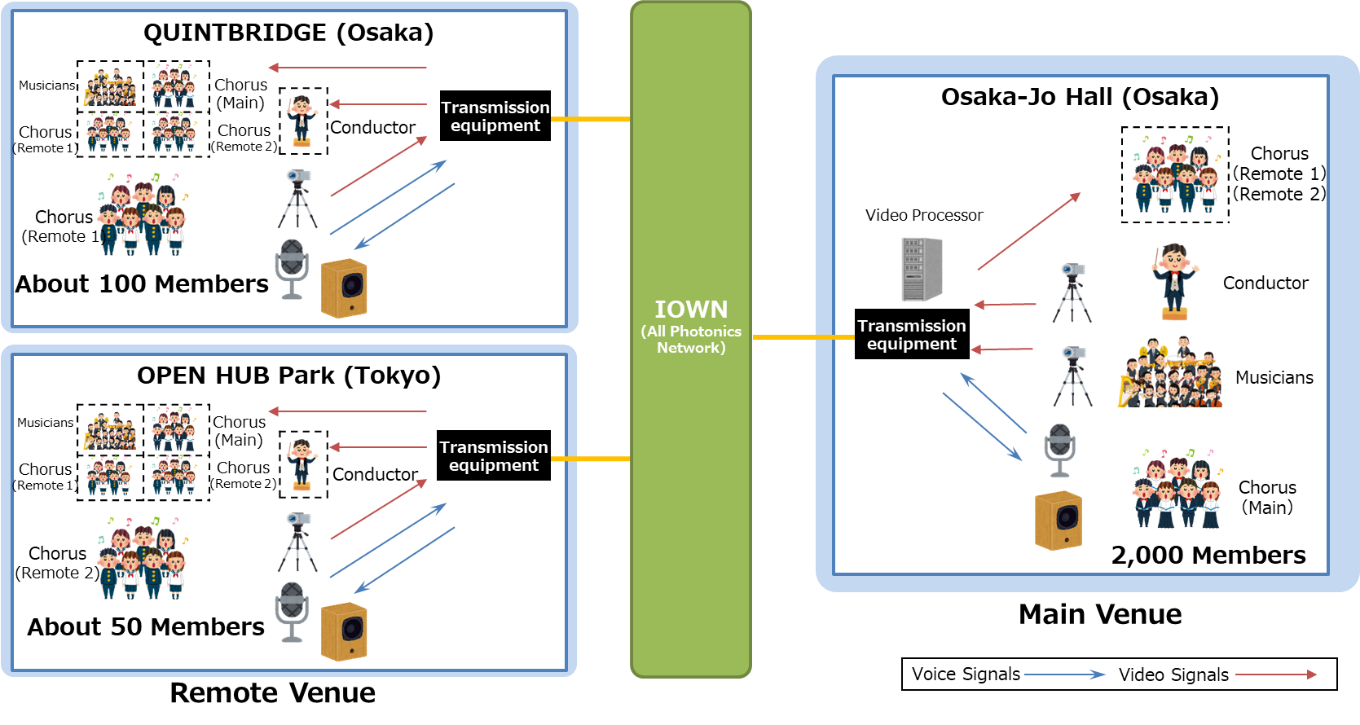Microsoft ends support for Internet Explorer on June 16, 2022.
We recommend using one of the browsers listed below.
- Microsoft Edge(Latest version)
- Mozilla Firefox(Latest version)
- Google Chrome(Latest version)
- Apple Safari(Latest version)
Please contact your browser provider for download and installation instructions.
December 1, 2022
Remote chorus demonstration for ultra-low latency real-time video communication
~ Realizing music events that make people feel like they are in the same place even if they are far away ~
Nippon Telegraph and Telephone Corporation ((NTT), President and CEO: Akira Shimada) will conduct a remote chorus demonstration using a video communications system consisting of IOWN All Photonics Network (APN) related technology with low latency that enables images to be exchanged between remote locations without time lag.
1. Background
As lifestyles have changed drastically during the Covid-19 Pandemic, the live entertainment industry has been exploring new ways to hold events that incorporate the fusion of the real and online worlds, such as live performances without spectators and virtual festivals.
NTT is conducting research and development under the Innovative Optical and Wireless Network (IOWN) initiative, which aims to realize a network and information processing infrastructure, including terminals, that can provide high-speed, high-capacity communications and enormous computing resources beyond the limits of infrastructure *1. One of the main technologies of the IOWN initiative is an All Photonics Network (APN) based on optical fiber, which offers overwhelmingly low-power-consumption, high-quality, high-capacity, and low-latency transmission.
As part of this APN technology, NTT has previously conducted remote ensemble experiments with professional string players using a technology that splits and displays multiple videos from multiple locations with ultra-low latency to realize video communications that require video synchronized actions. NTT has demonstrated that the ensemble can play together even remotely without the stress of video delays *2. We have also established and demonstrated technologies for transmitting high-quality video at ultra-low latency *3, *4.
NTT is exploring the applicability of these ultra-low latency technologies for real-time remote video communications to further use cases in various fields other than live entertainment.
2. Demonstration details
The demonstration will be conducted in collaboration with NTT West and NTT Communications (NTT Com) at the 40th anniversary performance of the annual chorus concert "Suntory Presents Beethoven's 9th with a Cast of 10,000", which has been held since 1983 by Mainichi Broadcasting Company, Ltd. *5. Three locations will be connected to demonstrate real-time remote chorus performance: Osaka-Jo Hall (Osaka), QUINTBRIDGE (Osaka), and OPEN HUB Park (Tokyo).
In this demonstration, we will examine whether remote chorus music can be performed without discomfort by using APN technology even in a venue where the conductor, musicians (orchestra), and choir are separated. In particular, we will examine the superiority of our technology to realize remote chorus singing on a large scale of approximately 2000 people (Osaka-Jo Hall) in a high-delay environment with long-distance signal propagation between Tokyo and Osaka, where the optical fiber length is approximately 700 km.
Here, NTT West will be responsible for providing the IOWN APN demonstration environment (Osaka-Jo Hall and QUINTBRIDGE), remote site (QUINTBRIDGE), and technical verification/evaluation, while NTT Com will be responsible for providing the IOWN APN demonstration environment (OPEN HUB Park) and remote site (OPEN HUB Park).

< Features of technologies used in this demonstration >
- Low-latency video processing technology *2: Technology that forms split screen display from multiple video streams delivered from multiple locations with ultra-low-latency.
- Low-latency communications technology *3: A communications technology that utilizes IOWN APN to achieve higher capacity, lower latency, and lower fluctuation than conventional best-effort quality networks.
- Delay visualization technology*3: Delay measurement and visualization technology with microsecond accuracy
- Low-latency video transmission technology *4: A technology that transmits large-capacity 4K/8K video directly through an optical path with uncompressed and ultra-low latency.
3. Future development
We will conduct research and development for the applications of APN technologies on the basis of the knowledge gained from this demonstration, explore the use of IOWN APN by demonstrating new use cases, and work together with NTT Group companies for the early practical application of a new style of video communications system, including developing its business value.
*1The IOWN initiative
https://www.rd.ntt/e/iown/index.html
*2Low-latency video processing technology
https://group.ntt/en/newsrelease/2022/03/04/220304a.html
*3Low-latency communications technology, delay visualization technology
https://group.ntt/en/newsrelease/2021/11/02/211102b.html
*4Low-latency video transmission technology
https://group.ntt/en/newsrelease/2022/02/22/220222a.html
*5'Suntory 10,000 Ninth'
https://www.mbs.jp/daiku/english/
Media Contact
NTT Information Network Laboratory Group
Planning Department, Public Relations Section
nttrd-pr@ml.ntt.com
Information is current as of the date of issue of the individual press release.
Please be advised that information may be outdated after that point.
NTT STORY
WEB media that thinks about the future with NTT










